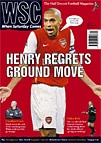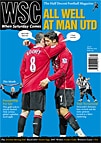 Dear WSC
Dear WSC
Jez Moxey, the Wolves chairman, has decided to ban Cardiff City fans from attending the match between the two clubs in January. This is a throwback to Margaret Thatcher’s attitude to football. Two seasons ago, I attended the match between Cardiff and Wolves at Molineux and it was one of the most scary experiences I have had at a football match, as the West Midlands Police decided to allow Wolves fans to wait to ambush Cardiff fans returning to their coaches. From what I can gather, embarrassed by their performance the previous year, the West Midlands Police decided to impose themselves in the repeat fixture last season. When a handful of City fans in the concourse at half-time started chanting “we want beer” after the bars changed their mind about staying open, the police decided to “calm things down” by charging into the concourse in full riot gear, beating anybody who failed to clear out of the way with their batons. They continued in this vein out of the concourse and up the gangways to the terraces, leading to people spilling on to the pitch to avoid being attacked. About 30 City fans attended hospital. Of the 17 that were arrested, all but one were offered apologies by the magistrates when they were discharged. An FA of Wales inquiry has yet to be completed, because West Midlands Police did not turn up to the hearing, twice. This is the same police force that refused to meet with fans’ representatives before both matches to plan away travel to avoid trouble. So who is to blame? Cardiff City fans, if you believe the West Midlands Police and Wolves. And the Football League, who agreed with the away fan ban, without bothering to seek the views of Cardiff City, the FA of Wales, any of the fans involved or the South Wales Police. This harks back to Luton Town’s away ban of the 1980s, which was snuffed out by the Football League. Why are they so happy for it to be reintroduced by Wolves? All teams, under League rules, are supposed to make a certain amount of tickets available to away fans. Perhaps a better solution would be to ban West Midlands Police from the fixture and invite South Wales Police to ensure there is no public disorder. But I guess that would not give Wolves the advantage of playing in front of no away fans.
Jeff Wagstaff, via email
Read more…
 Cameron Carter on Mourinho's touchline overreations and Goals Goals Goals
Cameron Carter on Mourinho's touchline overreations and Goals Goals Goals